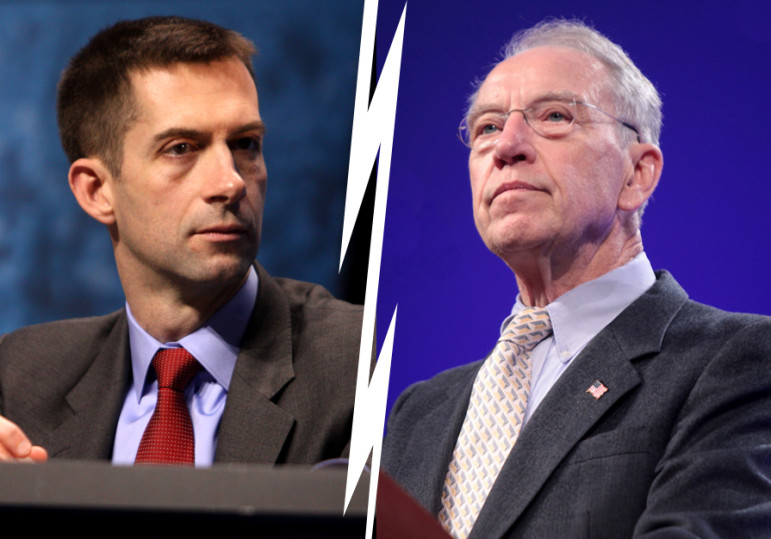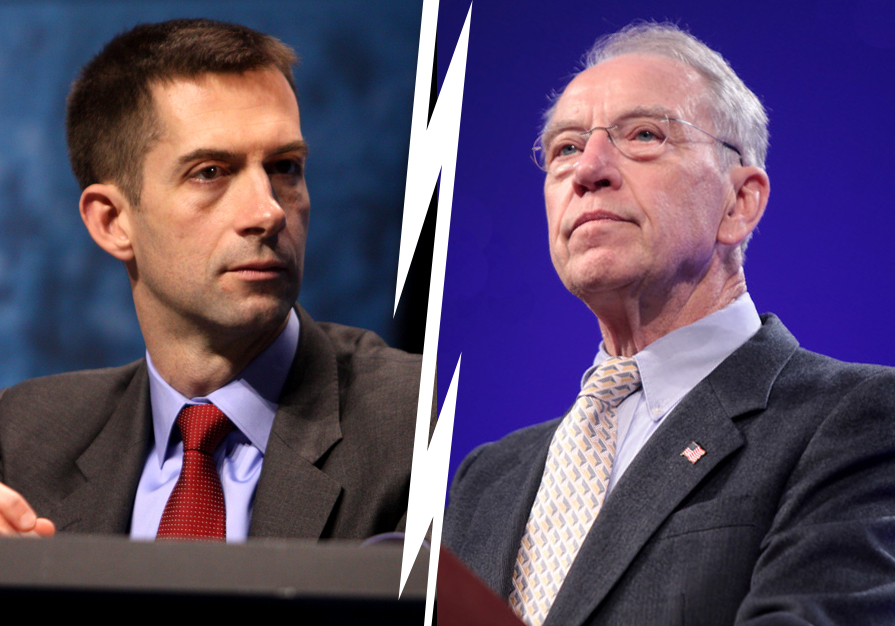
Sen. Tom Cotton and Sen. Charles E. Grassley
WASHINGTON — Key legislation that would strengthen protections for youth in the juvenile justice system still has a chance in the Senate.
A bipartisan bill (S 1169) to reauthorize the Juvenile Justice and Delinquency Protection Act stalled on the Senate floor last week when Sen. Tom Cotton, R-Arkansas, objected to a provision that would limit judges’ ability to send juveniles to lockup for status offenses.
The bill was considered under a fast-track procedure that clears the way for passage unless a lawmaker objects.
Sen. Charles E. Grassley, R-Iowa, chairman of the Senate Judiciary Committee, now is seeking a way to address Cotton’s concerns and move the bill to the floor once more.
“Chairman Grassley is going to continue to work with Senator Cotton to see if the issue can be resolved in hopes of passing something soon,” said Beth Levine, a spokeswoman for Grassley, in an email.
[Related: House Committee Hears Strong Calls for JJDPA Reauthorization]
The reauthorization is a top priority for juvenile justice advocates, who are urging swift action on the bill. In a year with a tight legislative calendar, they want to see the Senate pass the bill sooner rather than later so that action can move to the House, where lawmakers have yet to consider a similar measure.
JJDPA sets federal standards and provides funding for juvenile justice programs in state and local jurisdictions. The update reflects a growing body of best practices for how youth in the juvenile justice system should be treated, say the law’s supporters.
The JJDPA prohibits the detention of juveniles for status offenses, behaviors such as truancy or running away from home, except in one case — if a juvenile violates a valid court order issued by a judge. The reauthorization would phase out the exception, meaning states would have to comply or risk losing federal grants.
Cotton objected to a prohibition on the practice.
“I am concerned that the bill eliminates completely the ability for judges to order secure confinement for a short time in instances where a status offender flagrantly violates the judge's prior order for him to, say, enter into rehabilitation, counseling, or take part in other treatment services. In such narrow circumstances, it may be prudent,” he said on the Senate floor.
Most of the instances when juveniles are detained for status offenses occur in just a few states. In fiscal year 2014, when 7,466 juveniles were detained under the exception, 2,705 were held in Washington state, 1,048 in Kentucky and 747 in Arkansas, according to federal data. Many states did not use the exception at all.
Naomi Smoot, senior policy associate at the Coalition For Juvenile Justice, said detaining status offenders is a misguided practice that can worsen a juvenile’s situation rather than improving it.
Juveniles may face dangerous situations in detention, including the risk of physical and sexual violence, she said. Detention also doesn’t get at the root cause of status offenses, such as if a child is not attending school because of bullying or an undiagnosed special education need, she said.
“It’s a costly practice and it doesn’t have the benefits that people think it does for the kids behind bars,” she said.
More related articles:
Giving Inmates with Life Sentences 2nd Chance Is Right Thing to Do
Georgia’s Gov. Nathan Deal: ‘The Ultimate Criminal Justice Reform’


Everyone is missing the point. Senator Cotton is complaining that it restrains judicial discretion, but the JJDPA does not mandate how States behave. States can still legislate judicial discretion to allow judges to detain status offenders. If they do, they simply don’t get federal funsing for juvenile justice. The two are apples and oranges and I haven’t read or heard anyone talk about the real issue. Arkansas judges lock up status offenders and Cotton knows this. Someone needs to tell him that the JJDPA cannot force a State to change its laws. The JJDPA is no different than the IDEA, FURPA, or Title IVE for foster care. If the States want federal money they must conform. Why aren’t Cotton complaining about these federal laws or other laws that distribute federal funds so long as the States comply such as highway construction. Why single out the JJDPA and treat it differently? I am a judge and I don’t need Cotton coming to my rescue. His presumptuous and idealistic notion to help judges is in fact hurting children. His own Governor is trying to reform the juvenile justice system to include the reduction of detention of youth, especially status offenders. Cotton sounds like he is out of touch with his own republican governor.
Forgive my poor grammar–“aren’t” should be “isn’t,” and the typos. My rush diminished my typing skills, which are poor in the first place.